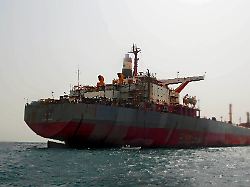Environmental hazard off Yemen’s coast
Salvage of scrap oil tankers is making progress
07/08/2023, 08:20 am
A huge floating oil storage facility with 1.1 million barrels on board is rusting away without maintenance because of Yemen’s civil war. In a race against time, the UN is raising money for pumping to prevent an environmental catastrophe for 12 million people. Despite progress, a residual risk remains.
The German government sees progress in the United Nations (UN) mission to salvage over a million barrels of crude oil from a dilapidated tanker off the coast of Yemen. “The technical preliminary tests for pumping out the oil are on the right track and almost complete,” said Deike Potzel, head of the Department for Crisis Prevention, Stabilization, Peacebuilding and Humanitarian Aid at the Federal Foreign Office in Berlin. “Such an action is an absolute novelty for the United Nations,” she emphasized. Experts had found during investigations “that the situation on the ship is fortunately not quite as critical as we had feared”. The UN operation off the coast of the civil war country Yemen is intended to prevent the 1.1 million barrels of oil in the ailing tanker “Safer” from escaping uncontrollably and leading to an oil spill.
The “Safer”, which is under the control of the Houthi rebels, has been lying in the Red Sea about nine kilometers off the coast of Yemen for years and is in danger of breaking up. That would lead to a gigantic oil slick with devastating ecological and economic consequences in and around the Red Sea. The 350-meter-long ship has not been serviced since 2015 due to the civil war in Yemen. The tanker is said to contain almost four times as much oil as spilled from the tanker Exxon Valdez, which ran aground off Alaska in 1989. The “Exxon Valdez” accident is considered one of the greatest environmental disasters in shipping.
UN estimates assume that twelve million people would be directly affected by damage to the environment and health. An oil leak could destroy the ecosystem for decades and severely disrupt international trade via the Suez Canal. In Djibouti on the Horn of Africa, a second ship bought by the UN, the “Nautica”, is waiting to go to the tanker “Safer” so that the oil can be pumped out.
Pumping out the oil takes several weeks
Potzel said preparatory work for pumping out is almost complete in principle. Divers had checked whether there was an additional risk from the outside. In addition, samples were taken to clarify the question of the quality of the oil with a view to possible resale. These samples have not yet been evaluated. “Now we are waiting for the start signal so that the ‘Nautica’ can actually set off to pump out the oil.” Pumping will probably take a few weeks. The UN and the experts have done their utmost to minimize the risks, said Potzel. “But you can never rule out the possibility that something will happen after all.” The “Safer” is a 40-year-old tanker that is rusting and has not been able to be maintained as it should have been for years. There is always a residual risk – even after pumping out, because some residual oil remains on board. Despite all caution, it remains a highly complex and dangerous operation.
In 2022, the UN and the Netherlands raised money for the operation at a conference. The total cost was estimated at $144 million. With a good 12 million US dollars, Germany is in third place among the donor countries, behind Saudi Arabia (18 million US dollars) and the Netherlands (15 million US dollars). It’s good that the Saudi government “recently provided additional money for the salvage,” said Potzel. Foreign Minister Annalena Baerbock campaigned intensively for such additional support during her trip to the Gulf in mid-May. Potzel spoke of an important sign that responsibility is also being taken from the region. “It shows that the Saudi partners are also aware of the impact such a catastrophe would have on them.” In addition to Saudi Arabia, Qatar and Kuwait are also involved.
Houthi rebels probably want to keep access roads free for salvage
$28 million is still missing to complete the mission. In Germany, for example, they contacted the private sector and sent a letter to 90 companies and associations asking for additional support. The UN also continued to try to address states as well as international associations and private companies. “It remains a big, big challenge,” said Potzel. Referring to the civil war, he said the Houthi rebels had promised to keep the access roads free for salvage. The federal government sees the mission “as an example of how a joint solution to a really big problem can be achieved”. The campaign could “also be a contribution to helping shape the future”. One shouldn’t rely too much on “that this means a big turning point, but it’s definitely a good sign.”
Yemen is located in the south of the Arabian Peninsula. The Shiite Houthi rebels have taken over large parts of northern Yemen there in their uprising that has been going on since 2014 and also control the capital Sanaa. The rebels are supported by Shia-majority Iran. Saudi Arabia has been fighting the Houthis with allies alongside the government in the country since 2015. One of the worst humanitarian catastrophes in the world is taking place in Yemen. About 21 million people are in need of some form of humanitarian assistance and protection.
